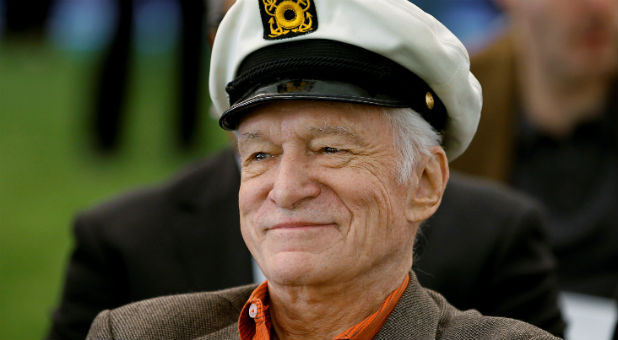If Hugh Hefner was the poster boy of the sexual revolution, Alfred Kinsey was the father of the revolution. But that is not the only thing that joins these men together. Both of them were overt rebels against “puritanical” Christianity, devoting their lives to “liberate” humanity from what they perceived to be the bondage of a sterile, restrictive morality.
Kinsey was born in 1894 and died in 1956. His claim to fame was his 1948 volume, Sexual Behavior in the Human Male, followed by his 1953 volume, Sexual Behavior in the Human Female. (Is it a coincidence that it was in 1953 that Hefner published the first edition of Playboy, featuring the Marilyn Monroe nudes?)
Kinsey twice made it to the cover of Time Magazine, and in 1953, Time even claimed that “he has done for sex what Columbus did for geography. …”
Despite this fanfare, and despite the rather tame summary of his life on Wikipedia (“an American biologist, professor of entomology and zoology, and sexologist”), Kinsey was by all accounts a sexual pervert. As summarized by Susan Brinkman, “He was a pederast who enjoyed public nudity, made explicit sex films and eventually developed such an extreme sadomasochistic form of autoeroticism that some believe it caused his untimely death in 1956.”
This is the man celebrated as the “father of the sexual revolution.” In his own words, “There are only three kinds of sexual abnormalities: abstinence, celibacy and delayed marriage.”
And what of his religious upbringing? When asked if Kinsey’s religious background influenced his research in any way,” Brinkman responded, “Absolutely. Kinsey was born into a strict Methodist home in Hoboken, New Jersey, in 1894. Dancing, tobacco, alcohol and dating were all forbidden. He eventually severed all ties with his parents—and their religion—and lived the rest of his life as an avid atheist.”
Kinsey was at war with God and with traditional religion, which to him were one and the same. (For the definitive study of the man, see the 939-page volume of James H. Jones, Alfred C. Kinsey: A Public/Private Life, published in 1997.)
The legacy of Hugh Hefner, who just passed away at the age of 91, is much better known to contemporary Americans, whose lives he has influenced dramatically.
Gone are the days when pornography was hard to find. Today it is ubiquitous.
Gone are the days when nudity was shameful, and a celebrity sex tape would forever destroy someone’s career (not to mention life). Today, it is fashionable to strip down to nothing, while a leaked sex tape can jumpstart a career.
In short, we’ve gone from Lassie to Game of Thrones and from The Facts of Life to Secret Diary of a Call Girl. Eight-year-old children now access porn; middle-schoolers engage in sexting; hundreds of thousands of teenage girls have STDs; and having kids out of wedlock is as normal as going to work in the morning.
As for Hefner’s religious upbringing, he said he was raised as a “conservative, Midwestern Methodist,” painting “a picture of guilt-ridden Puritanism, an environment and lifestyle he rejected and that caused him to become the ‘pamphleteer’ of the sexual revolution.”
As for his beliefs about God and traditional religion, he considered himself agnostic and remarked, “It’s perfectly clear to me that religion is a myth.”
Like Kinsey, he devoted his life to “liberating” people from the mores of this Puritanical faith, stating, “I believe embracing sexuality is a part of what it means to be free.”
Yes, the Christian religion itself was the oppressive enemy: “Historically,” he said, “the Puritans left England to escape religious persecution, and they promptly turned around and started persecuting the people they didn’t agree with – the scarlet letter A, and the stocks and the dunking board came from that. That puritanism is still there.”
And it was “that puritanism” he gave his life to combat, dying as the epitome of a dirty old man.
What is the offshoot of all this?
First, one has to wonder if either of these men were ever exposed to a vibrant, life-transforming, joyful, positive expression of the Christian faith.
Could it be that they first rebelled against legalism? Could it be that their war was initially with traditional religion, a religion of laws and commandments and regulations, all negative, as in “Thou shalt not,” and all imposed from the outside in? Could it be that all they saw was a restrictive faith rather than a redemptive faith?
This kind of religion does more harm than good, trying to legislate spirituality and enforce morality rather than introducing people to a living Christ who truly liberates and transforms.
Not only is this a cautionary tale for conservative Christian parents, it’s a reminder for pastors and religious leaders: We cannot ultimately force people to do the right thing. We can only set good examples, advocate for what is right, and engage in active evangelism.
Second, whatever the root cause of their rebellion might have been, in the end, it was clearly a war against “the Laws of Nature and of Nature’s God,” to quote the Declaration of Independence. These men were rebels and sex addicts, spreading a message and lifestyle that has brought bondage rather than freedom to untold millions. And although we had plenty of faults and blemishes in post-World War II America, we were a far more innocent, family-friendly nation in the days before Kinsey and Hefner.
What we know is that their legacy is undeniably shameful. The question is, can it be reversed?
(For practical thoughts on how a purity revolution can displace the sexual revolution, see my new book Saving a Sick America: A Prescription for Moral and Cultural Transformation, in particular, Chapter 10.)
See an error in this article?
To contact us or to submit an article

























